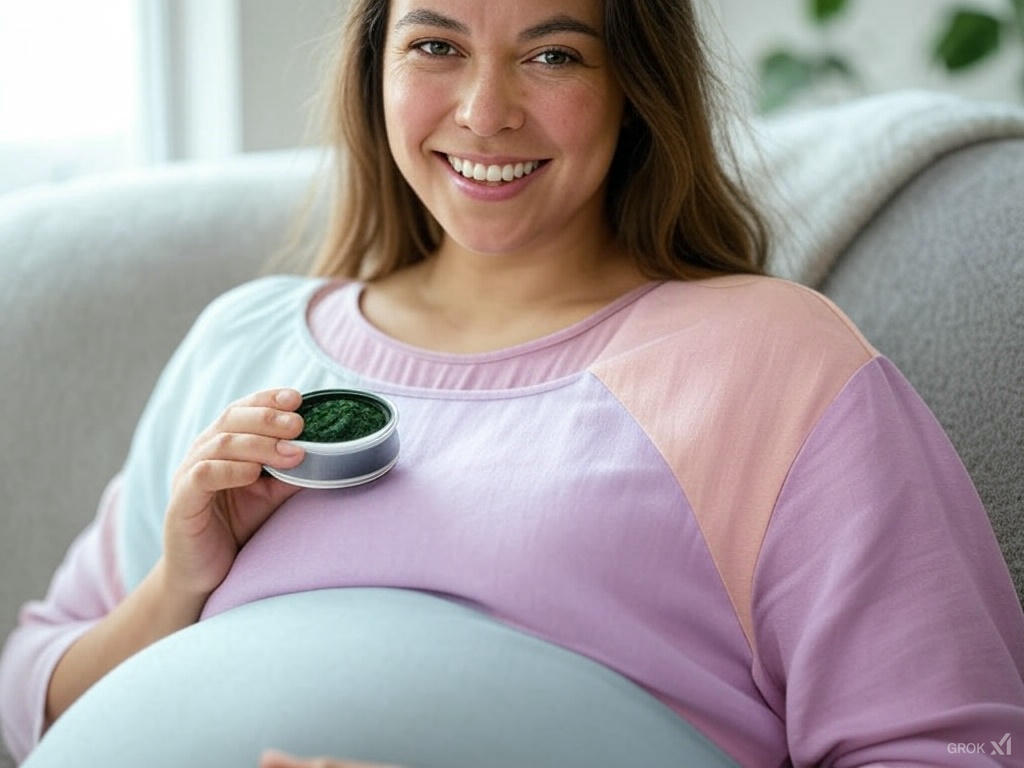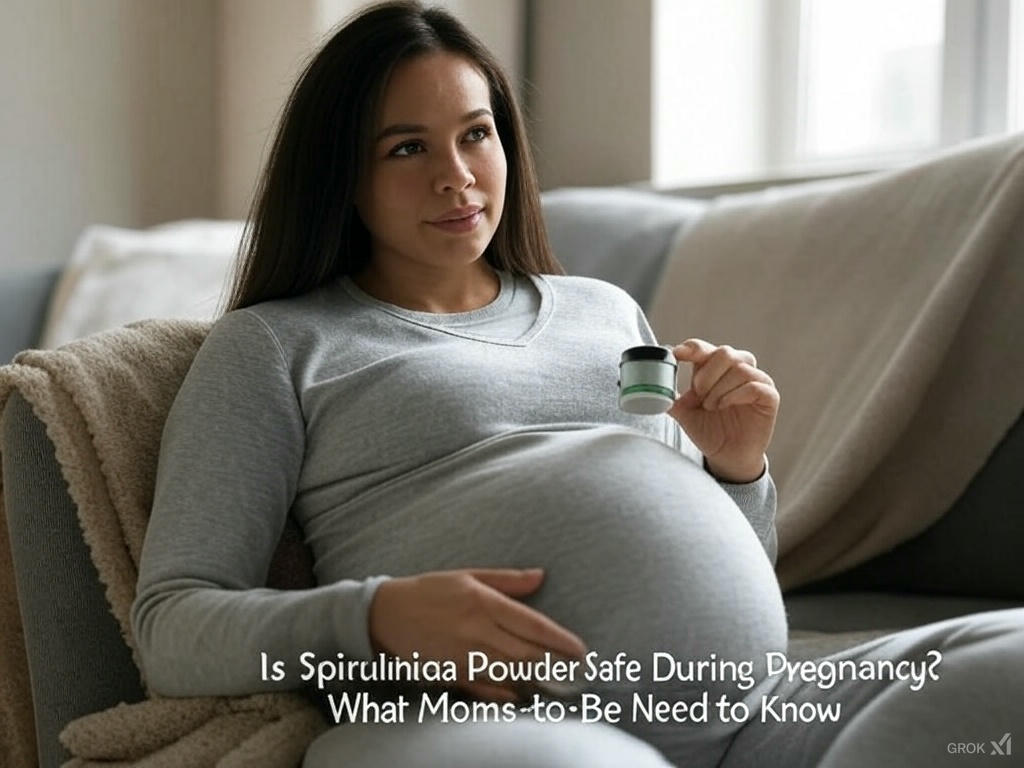Spirulina is a nutrient-dense superfood known for its high protein, iron, and antioxidant content. It is widely used as a dietary supplement to boost overall health. However, many expectant mothers ask, “Is spirulina powder safe during pregnancy?“
Spirulina offers several benefits during pregnancy. It is rich in iron, which helps prevent anemia, a common concern for pregnant women.
Additionally, it contains essential vitamins, minerals, and protein that support fetal development and maternal health. The antioxidants in spirulina may also strengthen the immune system and reduce oxidative stress.
Despite its benefits, pregnant women must be cautious when consuming spirulina. The safety of spirulina powder depends on its source.
Some spirulina products may contain heavy metals or harmful toxins if not sourced from a trusted supplier. To ensure safety, always choose organic, high-quality spirulina powder and consult a healthcare professional before adding it to your pregnancy diet.
Moderation is key, as excessive consumption may lead to digestive discomfort. If you experience any side effects, discontinue use and seek medical advice. While spirulina can be a great nutritional supplement, it is essential to prioritize safety during pregnancy.
Top Benefits Of Spirulina For Pregnant Women
Spirulina is rightly called a superfood because it is packed with essential nutrients. It contains vitamins A, D, E, and K, along with B-complex vitamins such as thiamine, riboflavin, niacin, vitamin B6, vitamin B12, and folic acid.
Additionally, it provides key minerals like potassium, calcium, zinc, magnesium, manganese, selenium, iron, copper, and phosphorus.
What makes spirulina even more beneficial is that all these micronutrients are naturally synthesized, making them easier for the body to absorb compared to synthetic supplements.
Including spirulina in a pregnancy diet can significantly enhance the intake of antioxidants and essential vitamins and minerals. During pregnancy, the body’s demand for these nutrients increases, making it important to consume nutrient-dense foods.
One of the most significant benefits of spirulina for pregnant women is its ability to help prevent iron deficiency.
Iron plays a crucial role in supporting both maternal health and fetal development. In the next section, we will explore in detail how spirulina can help combat iron deficiency during pregnancy.
Is Spirulina Safe During Pregnancy?
If you’re searching for definitive evidence on the safety of spirulina during pregnancy, you may not find much. Research on this topic remains limited, and experts have yet to reach a consensus.
Limited Research on Spirulina and Pregnancy
“There isn’t widespread agreement on the safety of spirulina during pregnancy because there have been very few human studies,” explains Nicole Avena-Blanchard, PhD, an assistant professor of neuroscience at Mount Sinai Medical School in New York and author of What to Eat When You’re Pregnant.
While spirulina is often praised for its rich nutrient profile—including protein, vitamins, and antioxidants—concerns exist regarding contamination.
Spirulina is a type of blue-green algae that can sometimes contain harmful toxins, such as heavy metals or microcystins, depending on its source. These substances can pose potential risks to both maternal and fetal health.

Possible Risks Of Spirulina For Pregnant Women
While spirulina is widely recognized for its nutritional benefits, its safety during pregnancy remains uncertain due to limited research. Here are some potential risks expectant mothers should consider before consuming spirulina:
1. Risk of Contamination
Spirulina is a type of blue-green algae that grows in freshwater environments. If sourced from unregulated suppliers, it may be contaminated with harmful substances, such as:
- Heavy metals (lead, mercury, arsenic) – Can pose risks to fetal brain development.
- Microcystins – Toxic compounds produced by certain algae that may cause liver damage.
- Bacteria and other toxins – Could lead to digestive issues or infections.
To minimize these risks, always choose spirulina from reputable brands that conduct third-party testing for purity and safety.
2. Immune System Stimulation
Spirulina has been found to stimulate the immune system, which may not always be beneficial during pregnancy. An overactive immune response could potentially lead to complications, especially for women with autoimmune conditions like lupus or rheumatoid arthritis.
3. Potential Allergic Reactions
Some individuals may be allergic to spirulina, experiencing symptoms such as:
- Skin rashes
- Swelling
- Difficulty breathing
- Digestive discomfort
Pregnant women with a history of food allergies or sensitivities should exercise caution when considering spirulina supplementation.
4. Digestive Issues
Spirulina can sometimes cause mild gastrointestinal discomfort, including:
- Nausea
- Bloating
- Diarrhea
Pregnancy itself can lead to digestive sensitivity, so adding spirulina might exacerbate these symptoms in some women.
5. Lack of Long-Term Human Studies
There is currently not enough clinical research on the effects of spirulina during pregnancy. Without clear evidence on its safety for fetal development, experts recommend consulting a healthcare provider before use.
Choosing The Right Spirulina Powder
If you decide to include spirulina in your diet during pregnancy, it’s essential to choose a high-quality product to minimize risks. Here are some key factors to consider when selecting the best spirulina powder:
1. Choose Certified Organic and Reputable Brands
Organic certification ensures that spirulina is grown without synthetic pesticides, herbicides, or harmful chemicals. Look for reputable brands that meet high safety standards, such as:
- USDA Organic
- NSF Certified
- Non-GMO Verified
These certifications indicate that the spirulina is free from harmful contaminants.
2. Look for Third-Party Testing
Since spirulina can be contaminated with heavy metals, microcystins, and bacteria, it’s crucial to choose a brand that conducts third-party lab testing. Trusted companies will provide lab results or Certificates of Analysis (COA) that verify their product’s purity and safety.
3. Check the Source of Spirulina
Spirulina is cultivated in various locations worldwide, but some sources are safer than others. The best spirulina comes from controlled environments with strict quality standards, such as:
- Hawaii – Known for high-quality spirulina with rigorous testing.
- California – Grown under strict state regulations.
- Certified farms in India and China – Ensure proper safety measures are followed.
Avoid spirulina from unregulated sources, as it may be contaminated.
4. Opt for Pure Spirulina Without Additives
Check the ingredient list to ensure you’re purchasing 100% pure spirulina powder without fillers, artificial colors, preservatives, or added sweeteners. Some flavored or mixed powders may contain ingredients that are not safe for pregnancy.
5. Consider the Form: Powder vs. Tablets
- Powder: Easy to mix into smoothies, juices, or foods, but has a strong taste.
- Tablets: More convenient for those who prefer to avoid the flavor but ensure they are free from harmful binders or additives.
6. Start with Small Amounts and Monitor Your Body’s Response
If your healthcare provider approves spirulina consumption during pregnancy, start with a small dose and observe how your body reacts. If you experience any discomfort or allergic reactions, discontinue use immediately.
Safe Dosage Of Spirulina In Pregnancy
Since research on spirulina’s safety during pregnancy is limited, there is no officially recommended dosage for expectant mothers. However, if your healthcare provider approves its use, here are some general guidelines to follow:
1. Stick to Small Amounts
Most spirulina supplements recommend a daily dose of 1–3 grams (about ½ to 1 teaspoon of powder or 2–6 tablets). Pregnant women should start with the lowest possible dose to monitor for any adverse effects.
2. Do Not Exceed 5 Grams Per Day
Some studies suggest that up to 5 grams per day is generally safe for healthy adults. However, during pregnancy, it’s best to stay on the lower end to avoid potential risks like contamination, immune system stimulation, or digestive discomfort.
3. Follow Your Doctor’s Recommendation
Since each pregnancy is unique, your doctor or nutritionist can help determine the right dosage based on your:
- Overall health
- Nutritional needs
- Potential risks or allergies
4. Monitor for Side Effects
If you experience nausea, digestive issues, allergic reactions, or unusual symptoms, stop taking spirulina and consult your doctor immediately.
5. Use Only High-Quality, Lab-Tested Spirulina
To minimize risks, choose spirulina that is certified organic, free from heavy metals, and third-party tested for purity.
How To Add Spirulina To Your Diet
If your doctor has approved spirulina for use during pregnancy, you can incorporate it into your diet in small, safe amounts. Since spirulina has a strong taste and deep green color, pairing it with complementary flavors can make it more enjoyable.
1. Add to Smoothies
One of the easiest ways to consume spirulina is by blending it into a smoothie. The natural sweetness of fruits helps mask its earthy flavor.
Try this pregnancy-friendly spirulina smoothie recipe:
- ½ teaspoon spirulina powder
- 1 banana (for natural sweetness)
- ½ cup frozen mango or pineapple
- 1 cup almond milk or coconut water
- 1 tablespoon chia seeds (for omega-3s)
- A drizzle of honey (optional)
Blend until smooth and enjoy!
2. Mix Into Juices or Lemon Water
Stir a small amount (¼–½ teaspoon) of spirulina powder into fresh orange juice, apple juice, or lemon water. The acidity helps balance the flavor.
3. Sprinkle Over Food
You can lightly sprinkle spirulina powder on:
- Avocado toast
- Salads
- Scrambled eggs
- Oatmeal
Start with a tiny pinch to test the taste before adding more.
4. Stir Into Yogurt or Applesauce
Mix a small amount of spirulina into plain yogurt or unsweetened applesauce. Adding honey or cinnamon can help improve the flavor.
5. Incorporate into Energy Bites
Make pregnancy-friendly spirulina energy balls by mixing:
- ½ teaspoon spirulina powder
- 1 cup oats
- 2 tablespoons nut butter
- 1 tablespoon honey
- ¼ cup shredded coconut
- 1 tablespoon chia or flaxseeds
Roll into bite-sized balls and refrigerate for a healthy snack.
Tips for Safe Consumption
✅ Start with a small amount (¼–½ teaspoon) and gradually increase if tolerated.
✅ Choose high-quality, lab-tested spirulina to avoid contamination.
✅ Balance with other nutrient-rich foods instead of relying solely on spirulina.
✅ Avoid heating spirulina, as cooking can reduce its nutrient content.
Final Thoughts: Should You Take Spirulina?
Spirulina is a nutrient-dense superfood, but its safety during pregnancy remains uncertain due to limited research. While it offers potential health benefits, risks like contamination, immune system stimulation, and digestive issues should not be overlooked. If you’re considering spirulina, consult your doctor first, choose a high-quality, lab-tested brand, and consume it in small amounts. For a safer alternative, focus on whole foods like leafy greens, nuts, seeds, and prenatal vitamins to meet your nutritional needs during pregnancy.

